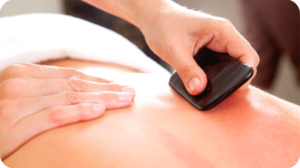Breathing is the most basic of human body functions. It’s also essential to every other process in the body. Unfortunately, because it’s automatic, we don’t usually consider if we are breathing as efficiently as we should. Turns out that many of us are not.

There are two avenues for taking in air: your mouth and your nose. These are very different structures. While the nose is designed for the passage of air, the mouth is better suited to chewing and pre-digesting food before it makes its way to the stomach. Breathing is basically a secondary function for the mouth.
A key difference between the two passages is the fine nasal hair that lines the nose and filters out contaminants such as pollen. The structure of the nose also ensures that incoming air is warmed to body temperature and moistened, both factors that enable the lungs to more efficiently process oxygen out of the air.
It’s not just about efficiency. Breathing mostly through the mouth can lead to a number of detrimental conditions, including dry mouth that may compromise oral health, lead to the proliferation of bacteria, and can dry out sensitive gum tissue causing bleeding.
The differences are amplified during sleep, when you’re not taking in food and drink that would restore moisture to the mouth.
Ensuring a Clear Nasal Airway
You are more likely to breathe through the nose when you care for nasal tissue and prevent issues.
- Clean. An over-the-counter saline nose rinse is a simple, natural way to remove build up pollutants collected by nasal hair, and to limit inflammation in the lining of the nose (which can lead to mouth breathing by default, especially during sleep).
- Repair. Structural defects to injury or genetics can restrict the flow of air through the nasal passages. You’ll sleep better if you consult a medical professional about correcting problems such as a deviated septum, or a broken nose that was never properly set.
- Hydrate. Generally drinking enough water (and eating healthy) will help limit inflammation in sensitive nose tissues. Adequate hydration also helps moves allergens out of your system and flush them out of the nose.
Mouth breathing can become a habit, especially during sleep. However, you can actually train yourself to breathe through the nose because breathing is subject to neuroplasticity—the ability of the brain to rewire neural pathways. The place to start is with intentional breathwork. Regularly do breathing exercises like the alternate nostril breathing taught in many yoga classes. It will be effort well spent, rewarding you with clearer mental functioning, more energy, and better sleep.
Share some love if you like this post!





